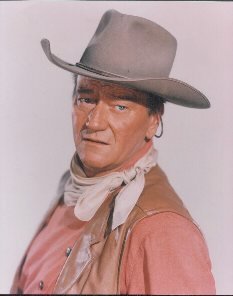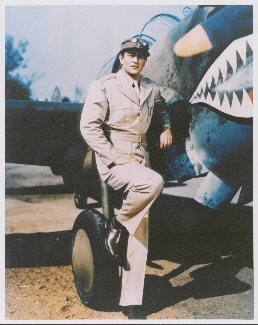JOHN
WAYNE
(May 26, 1907 - June 11, 1979)
 |
 |
Western Star |
Military Star |
For a complete filmography, click HERE.
John Wayne was born Marion Robert Morrison in Winterset, Iowa,
but his name was later changed to Marion Michael Morrison. At the age of six,
his pharmacist father, Clyde L. Morrison, failing in health, moved the family
to Southern California and became a homesteader with an 80-acre farm. Not
long after, the family settled in Glendale, where Mr. Morrison opened a pharmacy.
His store was in the same building as a theater, and young Marion, who rose
at 4 A.M. to deliver newspapers and then, after school and football practice,
delivered orders from the store, went to the movies four or five times a week,
free.
Marion acquired his famous nickname "Duke" from his
Glendale neighbors who started calling him "Big Duke," because he
never went anywhere without his Airedale dog, who was Little Duke. He preferred
"Duke" to "Marion", and the name stuck for the rest of
his life.
Marion had hoped to attend the U.S. Naval Academy and was named
as an alternate selection to Annapolis, but the first choice took the appointment.
Instead, he accepted a full scholarship to play football at the University
of Southern California under legendary coach Howard Jones.. An injury while
swimming at the beach curtailed his athletic career, however; Wayne would
later note that he was too terrified of Jones' reaction to reveal the actual
cause of his injury. While there, Coach Jones, who often found summer jobs
in the movie industry for his players, got Duke work in the summer of 1926
as an assistant prop man on the set of a movie directed by John Ford. His
first starring role was in the movie The Big Trail. Raoul Walsh,
the director, gave him the stage name "John Wayne", after Revolutionary
War general "Mad Anthony" Wayne.
His friendship with Ford led them to work together on films which featured
some of Wayne's most iconic roles. Beginning with three minor parts in 1928,
Wayne would appear in over twenty of Ford's films in the next 35 years, including
Stagecoach (1939), She Wore a Yellow Ribbon (1949), The
Quiet Man (1952), The Searchers (1956), The Wings of Eagles
(1957), and The Man Who Shot Liberty Valance (1962).
JOHN WAYNE: AMERICAN MILITARY HERO
When World War 2 broke out, John Wayne tried to enlist but
was rejected because of an old football injury to his shoulder, his age (34),
and his status as a married father of four. He flew to Washington to plead
that he be allowed to join the Navy but was turned down. So he poured himself
into the war effort by making inspirational war films - among them The
Fighting Seabees, Back to Bataan and They Were Expendable.
To those back home and others around the world he became a symbol of the determined
American fighting man..
Despite his prolific output John Wayne won only a single Best
Actor Oscar, for the 1969 movie True Grit. He received a nomination
for Best Actor in Sands of Iwo Jima, and another as the producer
of Best Picture nominee The Alamo, which he also directed. His production
company was called Batjac, an accidental misspelling of his character in Reap
the Wild Wind. In 1973, he released a best-selling spoken word album,
that was nominated for a Grammy, and re-released with similar success in 2001.
John Wayne died of lung cancer on June 11, 1979 in Newport Beach,
California, and was interred in the Pacific View Memorial Park cemetery in
Corona del Mar, Orange County, California. He was married three times; to
Josephine Alicia Saenz, Esperanza Baur, and Pilar Palette. He had four children
with Josephine and three with Pilar.
CONGRESSIONAL GOLD MEDAL
A Congressional Gold Medal was presented to John Wayne's family
at the Capitol on March 6, 1980, the result of a bill presented to Congress
by Wayne's friend Sen. Barry Goldwater.
~~~~~~~~~~~~~~~~~~~~~~~~
HIS MEMORY LIVES ON IN WAYS OTHER THAN MOVIES
 The
John Wayne Cancer Institute (JWCI) was formed in 1991 as an institute for
cancer research and post-doctoral education. Prior to this date, the Institute
was known as the John Wayne Cancer Clinic at the University of California,
Los Angeles.It was named in memory of the late great actor, John Wayne, who
was treated for stomach cancer at UCLA. After his death in 1979, the Wayne
Foundation, headed by eldest son Michael, was determined to support this group
of scientists and clinicians in their goal of curing this dreaded disease.
The
John Wayne Cancer Institute (JWCI) was formed in 1991 as an institute for
cancer research and post-doctoral education. Prior to this date, the Institute
was known as the John Wayne Cancer Clinic at the University of California,
Los Angeles.It was named in memory of the late great actor, John Wayne, who
was treated for stomach cancer at UCLA. After his death in 1979, the Wayne
Foundation, headed by eldest son Michael, was determined to support this group
of scientists and clinicians in their goal of curing this dreaded disease.
The John Wayne Cancer Institute depends on the generosity of
our donors to fund our fight against cancer. Each donation is vital, whether
it is given by a foundation, in a bequest, or dollar-by-dollar in a fundraising
event. Click here to find
out how you can help!
~~~~~~~~~~~~~~~~~~~~~~~~
For more information on "The Duke," visit these
great websites:





